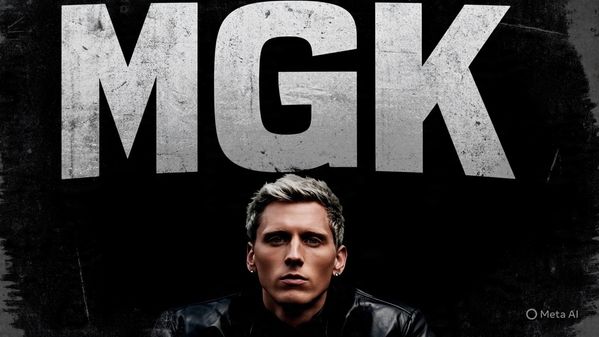MGK’s new album: why Lost Americana is the pivot he’s actually been working toward

MGK’s new album: why Lost Americana is the pivot he’s actually been working toward
I’m writing this as someone who’s tracked Colson Baker’s reinventions for years — the mixtape years, the rap-rock scrapper, the pop-punk uprising, the tabloid-era turbulence. MGK’s new album, Lost Americana, doesn’t read like another surface-level genre stunt. It reads like a mid-career excavation: a record that uses heartland-tinged arrangements and widescreen production to let confession land. That’s my core thesis: MGK stops performing identity-switching here and starts interrogating what those identities cost him — to himself, to his family, and to the fanbase that watched him mutate in public.
Below I’ll walk through what the album sounds like, why its marketing moves (yes — the Bob Dylan trailer and the hometown “MGK Day”) matter, how the record’s narrative choices reframe Baker’s public persona, and what artists and industry pros can learn from the rollout. I’ll also flag the tracks that matter, share the exact release timeline and sources, and answer the questions readers actually ask when they search “MGK’s new album.”
Quick facts (if you want the headlines)
-
Album: Lost Americana — released August 8, 2025 (street dates vary by timezone and outlet).
-
Lead single: “Cliché” — released May 23, 2025.
-
Other high-profile tracks/entries: “Treading Water” (the confessional centerpiece), “Outlaw Overture” (lead video push).
-
Unusual promotional coup: album trailer narrated by Bob Dylan — widely reported and confirmed.
-
Local activation: Cleveland “MGK Day” weekend tied to the album release, including free performances and community activations.
Why Lost Americana matters beyond the headlines
Most pop-era reinventions are shorthand: a sonic trick to chase trends or tabloids. This record feels different because the sonic choices are functional — they aren’t just for shock. Swapping pop-punk adrenaline for heartland textures and widescreen guitars gives MGK room to dwell in sentences instead of one-liner spectacles. The result: where older songs demanded reactions, these invite listeners into a conversation. That’s rare for an artist whose public life has often outpaced his art.
Two strategic moves make the point loudest. First, inviting — or at least publicizing — Bob Dylan’s narration for the album trailer rewrites expectations: it frames the work as an intergenerational Americana statement, not an Instagram moment. Second, anchoring the release in Cleveland with “MGK Day” turns a commercial release into civic theater; it ties a narrative of hometown authenticity to the record’s thematic bones. Together they say: this is not a pivot for clicks, it’s a repositioning of identity.
The sound: palette, production, and standout moments
If you listen with an ear for arrangement rather than headline, you’ll notice three consistent moves:
-
Roomy, analog-forward production. Guitars are recorded with air; drum rooms breathe. It’s a surfacing of texture over speed. The production team (longtime MGK collaborators plus established rock producers) uses space to let lines land.
-
Genre as emotional color, not label. Tracks pull from heartland rock, alt-country, and widescreen alt-rock. The shift isn’t total; fragments of his pop-punk cadence remain, but they’re married to melodies that favor resolution over provocation.
-
Narrative first; hook second. Whereas earlier records leaned on earworms and immediate shock, songs here prize a storytelling first verse and a lyrical turn that reframes the chorus. That’s why “Treading Water” registers: it’s less about a singalong and more about a paragraph that stops you.
Track highlights (select)
-
“Cliché” — The lead single trades arena chords for pop-era polish. It’s deceptively light: an earworm with lyrics that hint at vulnerability and relationship aftermath. It was the first signal this album would favor sentiment over snark.
-
“Treading Water” — The emotional core. Critics and listeners flagged it as the moment MGK leans into accountability: rehab references, regrets, direct address to family. It’s restrained, and because of that restraint, it cuts.
-
“Outlaw Overture” — A cinematic opener and the centerpiece of the music video push. It’s careful in world-building: overtures imply chapters, and this acts like a thesis for the rest of the record.
Marketing as narrative: the Dylan trailer and hometown theater
Two promotional moves are worth unpicking because they’ve driven conversation beyond the fanbase.
Bob Dylan narration. Whether you read it as serendipity or clever positioning, Dylan’s narration reframes Lost Americana as part of a lineage. That’s useful culturally: it signals serious artistic intent and invites legacy press to cover the project with a different lens than typical pop media do. MGK himself expressed awe at the collaboration when confirming Dylan’s involvement publicly, which made the partnership feel authentic rather than purely transactional.
MGK Day in Cleveland. Making the release a communal event is a classic festival play, but MGK’s team timed it tightly with the album launch to tether authenticity to place. The Rock & Roll Hall of Fame and local outlets documented the weekend of activations, turning the release into an earned hometown story, not just a national PR push. For an artist whose identity is frequently debated, place-based marketing solidifies roots — and that matters to fans who crave connection.
What this record does to MGK’s public persona
MGK has always been a performative artist: flamboyant, reactive, and comfortable at the center of cultural flame wars. Lost Americana operates differently: it’s declarative about consequences. By foregrounding domestic life (fatherhood), accountability (rehab and mistakes), and a desire to be read honestly, the album pushes Baker toward a mature narrative arc. That arc makes his previous stunts easier to interpret as chapters rather than the whole book. If the record is convincing — and that’s always subjective — it will shift critical conversation from “what did he do now?” to “what does he mean?”
Who will connect with Lost Americana — and who might not
-
Will connect: Longtime fans willing to follow an artist across genres; listeners who favored Baker’s more confessional moments; critics who value narrative ambition.
-
Might resist: Pop-punk purists who prefer adrenaline over reflection; listeners expecting the same maximal hooks of previous eras; casual listeners who encounter MGK for the first time via a viral clip and expect instant gratification.
This nuance matters for marketing: don’t treat this as an across-the-board fan conversion; it’s a re-engagement strategy that rewards attentive listening.
Lessons for artists and marketers (actionable takeaways)
-
Make promotion part of the story, not the noise. A well-placed cultural signal (Dylan narration) can reframe coverage and broaden the audience beyond niche outlets.
-
Anchor releases in place when authenticity is a selling point. If an album trades on “home” or “roots,” local activations (free festivals, hometown events) convert narrative into lived experience.
-
Use sonic space to invite attention. Production choices that favor texture over density can make confessional lyrics register — the quiet makes the admission louder.
-
Don’t treat genre-hopping as a gimmick. If you’re changing lanes, invest in the genre’s vocabulary (arrangement, instrumentation, narrative) so the pivot feels like craft, not costume.
A short production & credits note
Lost Americana credits longtime collaborators (SlimXX, BazeXX, Nick Long among others) and lists a mix of producers who’ve worked across MGK’s recent eras, which helps explain the record’s hybrid sound: polished pop sensibilities threaded through rock instrumentation. Official streaming and store pages list the release date and tracklist; physical editions (store exclusives, colored vinyl) were available for pre-order leading up to August 8.
How critics are responding (digest)
Early reviews are mixed but curious. Local press and niche rock outlets praised the album’s ambition and featured tracks like “Treading Water” for their emotional honesty, while some critics noted unevenness where MGK’s bravado still peeks through. Overall, the narrative framing — the Dylan trailer, the hometown release events — has shifted conversation in credible outlets toward artistic evolution.
Table — Track callouts (selective)
| Track | Why it matters |
|---|---|
| “Cliché” | Lead single that introduced the album’s softer pop sensibility. |
| “Treading Water” | The confessional centerpiece; critics and listeners flagged it for its narrative weight. |
| “Outlaw Overture” | Cinematic opener; anchors the visual campaign. |
Personal note — what it felt like to listen (first-person)
I remember sitting in a dim hotel room the week Tickets to My Downfall topped charts and thinking MGK had chosen explosive urgency as his signature. Listening to Lost Americana, that urgency is quieter but heavier. I put on “Treading Water,” closed my laptop, and scribbled lines of lyric instead of marketing notes — proof that the record asked for a different kind of attention. If you’ve followed Colson Baker’s public life, this album feels like a moment of breathing out, not another gasp.
FAQs (what readers searching “MGK’s new album” actually want to know)
Q — When exactly did MGK release Lost Americana?
A — The album was released August 8, 2025 (some outlets and region-based listings reference Aug 9 depending on timezone). Official store and streaming pages list Aug 8 as the street date.
Q — Is the voice in the album trailer really Bob Dylan?
A — Yes. Dylan’s narration of the trailer was widely reported and confirmed in interviews and press coverage; MGK publicly reacted to the collaboration.
Q — Which songs should I listen to first?
A — Start with “Cliché” (the lead single), then “Treading Water” for the emotional core, and “Outlaw Overture” to taste the cinematic framing.
Q — Did MGK tie the album to any live events?
A — Yes. The release coincided with Cleveland’s weekend-long MGK Day, featuring community activations and performances tied to the album rollout.
Q — Is this a permanent genre change for MGK?
A — Hard to claim permanence at this stage. The record is a deliberate pivot toward Americana-inflected textures, but MGK’s career shows he’ll keep experimenting. Read this album as a serious chapter rather than a forever label.
Final take — why this matters to listeners and the industry
Lost Americana is important because it changes the question we ask about MGK. Instead of “what will he do next?” we can ask “what does he mean now?” That’s a subtle but consequential shift. Musically, it’s an adult, literate record that grants its admissions the space they need. From a marketing standpoint, it models how narrative-driven promotion (legacy voiceovers, place-based activations) can elevate media discourse. For artists and teams, the lesson is clear: if you want to be taken seriously for change, make the change in the work first — then design promotional moves that confirm the narrative rather than manufacture it.




mkpn8u
s5mi6y
j4z8fy
Real good info can be found on blog. “Prayer is the wing wherewith the soul flies to heaven, and meditation the eye wherewith we see God.” by Ambrose of Milan.
I have been browsing online greater than three hours nowadays, yet I never found any interesting article like yours. It is beautiful value enough for me. In my view, if all web owners and bloggers made good content material as you probably did, the internet will probably be a lot more helpful than ever before.
7ixx7i